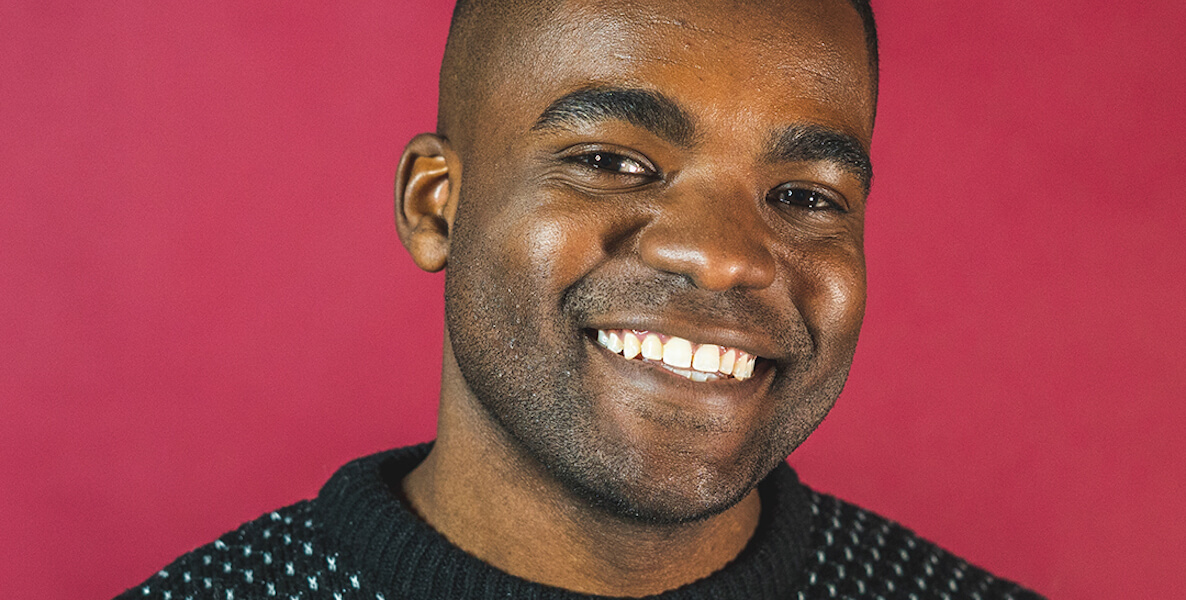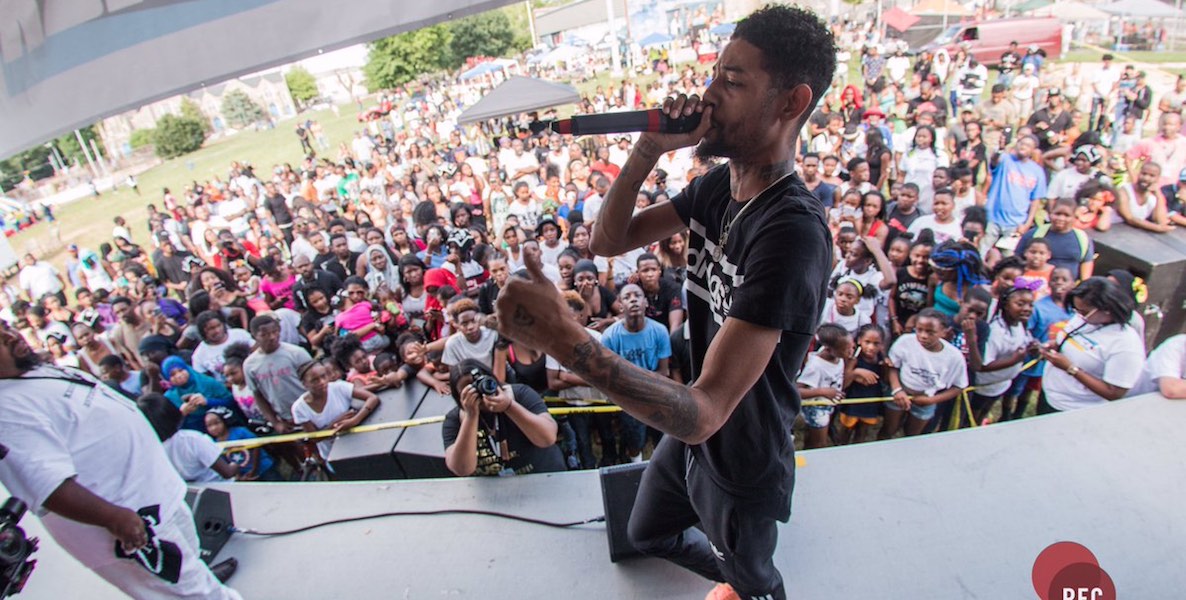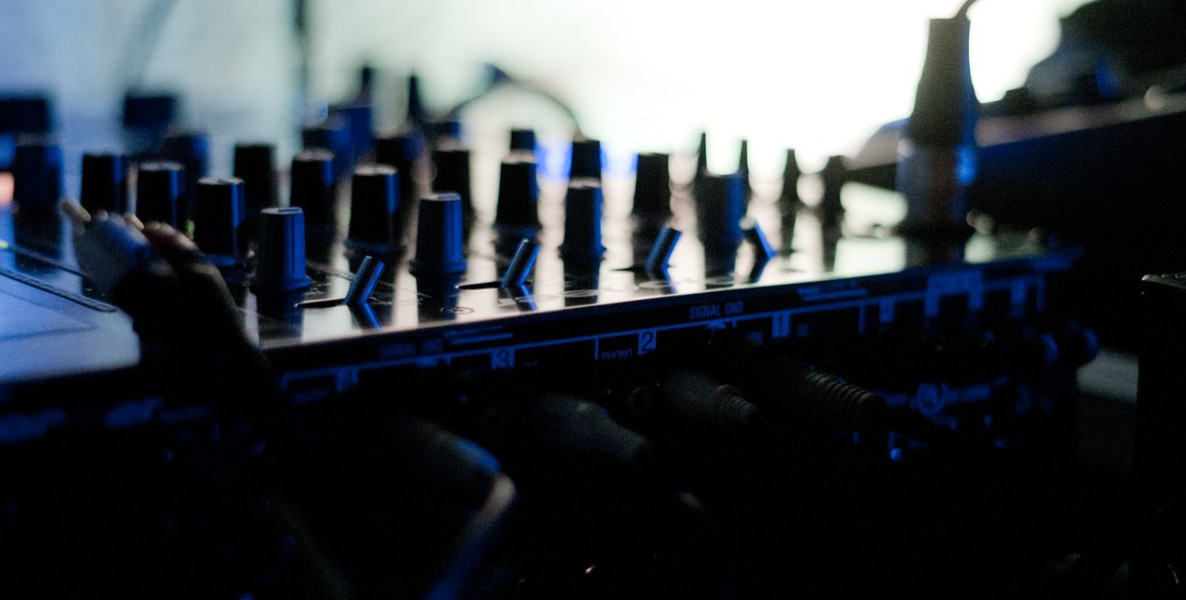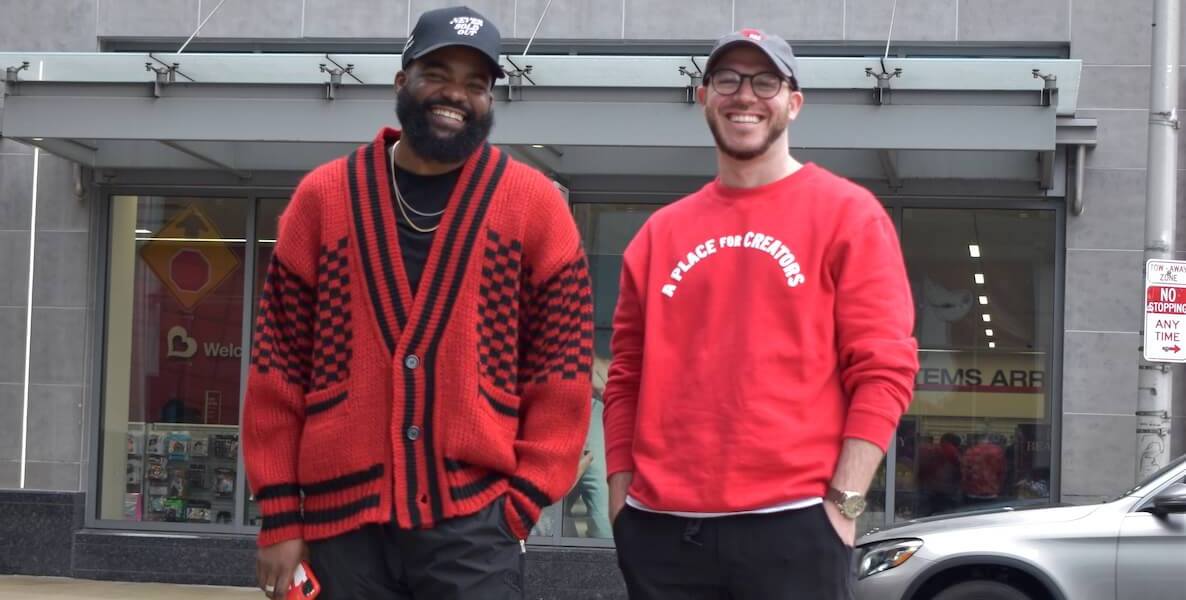Early in the morning of December 1, 2020, REC Philly co-founder Dave Silver was scrolling through his email inbox when he stopped short at a message from Forbes magazine.
He opened the email and read the news: He, along with William Toms, had been named to the 2021 Forbes 30 Under 30 list—a goal of Silver’s since he and Toms founded REC Philly—billed as a “co-working space for creatives”— out of an old North Philadelphia window factory in 2015.
“It was such a surreal experience, being one of my personal bucket list items since we first started the company,” Silver says.
MORE ON YOUNG ENTREPRENEURS DOING GOOD IN PHILLY
The high school best friends-turned-business partners, both 29, were recognized by Forbes in the social impact category, which honors those who are “leveraging business smarts to save the world.” For Silver and Toms, that has meant providing local artists with the resources they need to build their careers while staying in Philly.
In keeping with that mission, REC Philly is decidedly more than your average WeWork. Their new headquarters in the Fashion District mall, which they opened in 2020 after closing their North Philly location, features recording studios, audio and video editing bays, and a Live Nation-sponsored stage that hosts performances by Philly artists. The company also offers programming that helps creatives better understand the business side of performing and selling their art.
A bump in the road
But it was 2020 that really put their mission of supporting the city’s creative talent to the test. As the virus spread through the city, mandated shutdowns closed many of the venues where REC Philly’s members performed to earn their living. The loss of revenue was too much for some venues, which are now permanently shuttered. Arts businesses and organizations in Pennsylvania lost over $48 million, according to data collected by Americans for the Arts, with the median amount lost by individual organizations $27,000.
Government support for artists has also been limited. Philadelphia Mayor Jim Kenney and other City Officials proposed eliminating the Office of Arts, Culture and the Creative Economy and cutting off funding for the Philadelphia Cultural Fund in their proposed budget for 2020-21. Though funding for the arts in Philadelphia eventually made its way back into the city’s budget, cuts were drastic. The Cultural Fund’s budget was cut to one-third of the $3 million it had pre-pandemic.
In the face of the pandemic, Silver and Toms did what they always have done: They pivoted to help struggling artists. Like every business that survived the pandemic, they reinvented their membership model so that they could continue to virtually provide artists what they needed to run their businesses, while also working with local businesses to raise funds for a grant program that provided monetary support to the city’s struggling creative class.
This quick pivot allowed the company to not only survive the pandemic, but to grow. Now, the business is looking to expand to other U.S. cities while continuing to expand operations in Philly.
Origin story in a nutshell
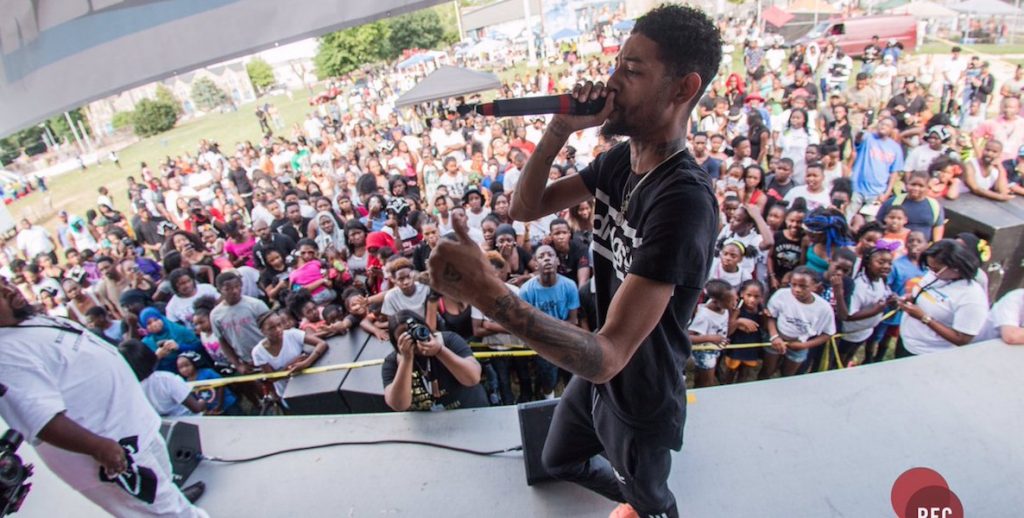
Back in 2015, Toms and Silver founded REC Philly with a simple mission: to help creatives build successful careers in Philly. The duo had spent their career bootstrapping through Philly’s music promotion scene, building deep connections with artists in the process, and they didn’t want to see talent flee for New York or L.A., as is so often the case with creative classes in smaller cities.
Silver’s career started off by booking shows in the basement of his Temple University frat house and later—after getting shut down by L&I for operating without a business license—a bar/hookah lounge near the school. He and Toms formed Broad Street Music Group and began helping musicians book concerts at World Café Live.
As they worked to promote undiscovered talent, they found that many artists loved Philly, but didn’t feel that the city had the infrastructure they needed—studio space, access to talent coaches and legal resources, information about booking jobs—for them to be successful as artists.
“We realized how real it was for a lot of our members who were disproportionately affected by the pandemic because they’d been making a lot of money on the road,” Toms says.
“We realized how challenging it was to [build a career as a creator], especially in a city like Philadelphia where we had a ton of creative talent, but unfortunately not a clear industry infrastructure,” Toms says.
Within months of launching REC Philly, the pair had traveled to South By Southwest (SXSW) in Austin, Texas, for a Philly SXSW showcase that brought national attention to both their budding business and a host of Philly artists.
Since then, their business and membership levels have continued to grow, leading them eventually to move out of the old window factory space and open their new 14-studio headquarters in the Fashion District.
The Covid-19 shuffle
All that experience building and growing an innovative company for creators empowered Toms and Silver to pivot quickly once the pandemic hit.
The 22 in-person events they had planned for March? Those shifted to become virtual events “almost overnight,” Toms says, and they’ve continued to host events ranging from concerts to training about the different aspects of running a business to creative coaching
“Having the connection to our community during the time when we were all isolated and lonely in our homes helped us to build out that digital membership,” Toms says (more on that in a bit).
While the digital events were a great way to keep REC’s community alive during the pandemic, virtual performances weren’t going to be enough to support the city’s artists and musicians. So, during the early stages of the pandemic, Silver and Toms called every single one of REC Philly’s hundreds of members to see what kind of support they needed.
“When they go to REC Philly and see other people who look like them and are not more than five to ten years older than they are creating, it doesn’t seem like it’s so impossible for them to do anymore,” Aponte says.
Previously, they’d offered three different membership tiers ranging in price from $49 per month to $149 per month, which provided creators with a range of in-person services, including studio access, office hours and free access to live events.
In order to pivot to meet their members’ needs virtually, they created Slack channels to keep members connected and, in April, they launched their digital membership, which offered access to business templates, free programming, a job board and educational resources for $19 per month. Known as REC Digital, the program enabled creators to continue to create work and find Covid-safe job opportunities during the pandemic.
“We were booking gigs for local creators and putting money in their pocket, all through that time period,” Silver says.
For many creators, a digital membership wasn’t enough to sustain them during a pandemic that cut off much of their income. Local bands, dancers and photographers rely on performances and live events for the money they need to survive. And so while the digital memberships were a great way to continue offering resources to their community, there was still more that needed to be done in terms of providing creators with the financial resources they needed to get through the pandemic.
“We realized how real it was for a lot of our members who were disproportionately affected by the pandemic because they’d been making a lot of money on the road,” Toms says.
REC Relief is born
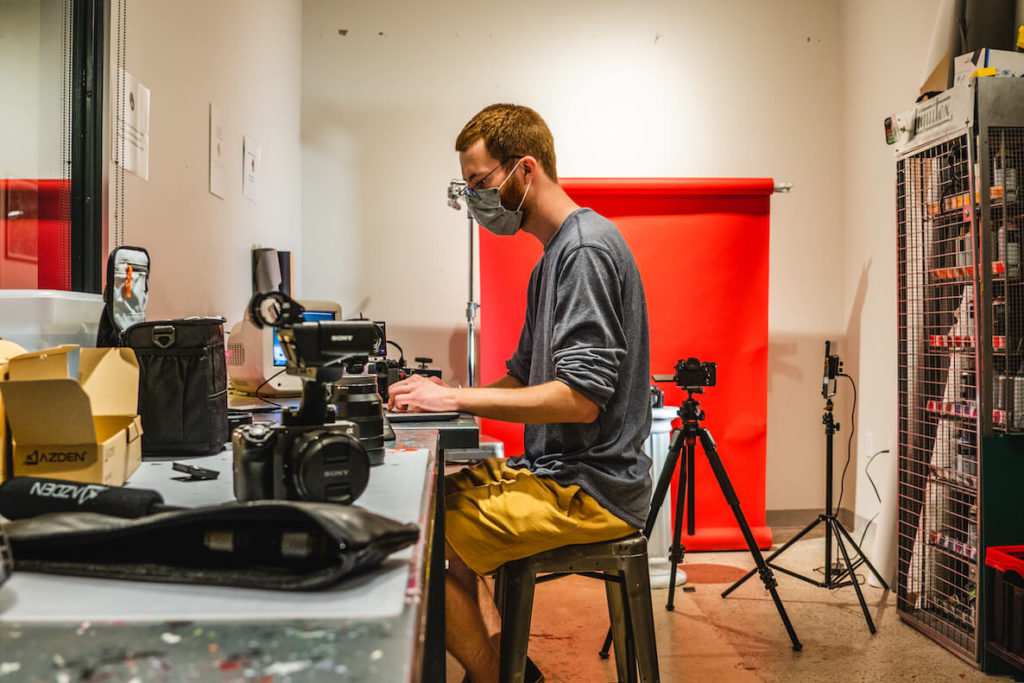
To help artists struggling with the financial impact of the pandemic, Toms and Silver launched REC Relief, the program that distributed grant money and sponsored REC Philly memberships to creators. REC Philly’s team partnered with local businesses, including the Philly-based consulting firm O3, Workhorse Brewing Company, and Black Music City Philadelphia to fund the project.
In their first round, they raised $20,000 in funding from local businesses to give out 50 microgrants and more than 40 free REC Philly memberships. They received over 1,000 applicants.
Now, the program has distributed $75,000 worth of grants and sponsored memberships to creators.
For Philly-based singer/songwriter Seraiah Nicole, these resources were critical to keeping her music career on track during the pandemic. Nicole received both a year-long membership sponsored by Urban Outfitters and a microgrant that allowed her to purchase the recording equipment she needed to record an EP out of her home. REC Philly supported the album’s release by booking Nicole for their virtual Juneteenth performances, and she was also able to find virtual gigs through their job board.
LISTEN: To Seraiah Nicole’s new album, The Truth Is
“It’s been a blessing for me,” Nicole says. “Now I have a whole year free to create and to continue to thrive. It feels really good.”
These grants aren’t just supporting the current generation of Philly talent, however. They’re also helping future artists get their start. Carlos Aponte, a high school teacher, Philadelphia Citizen Integrity Icon and founder of We Love Philly—a nonprofit that empowers young people to channel their passion into making a difference in the city—received a year-long sponsored membership to the space from Comcast that allows him to bring in his students.
Aponte and his students have used the space to record and edit their podcast, which focuses on volunteering and highlights the work of local leaders and organizations that are improving Philadelphia. One student had been using REC Philly’s movement studio to record TikTok videos for his nearly half-million followers; others were learning video editing, music recording and other creative skills.
LISTEN: To Carlos Aponte’s We Love Philly podcast
“When they go to REC Philly and see other people who look like them and are not more than five to 10 years older than they are creating, it doesn’t seem like it’s so impossible for them to do anymore,” Aponte says. “REC Philly is important for my students, and just humans in general, because you are learning to tell your story right there.”
A focus on Black creatives
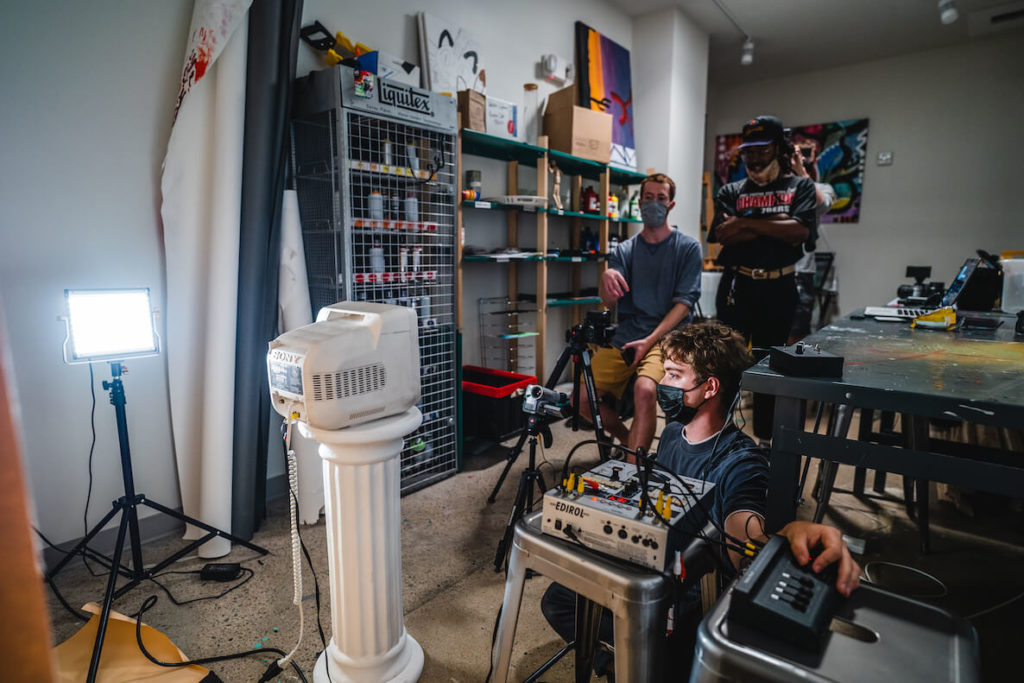
In addition to the REC Relief program, REC Philly worked with WXPN and WRTI to launch their Black Music City grants, which provide funds to Black creatives in Pennsylvania, Delaware and New Jersey who are working on projects that honor Philly’s Black music history.
The program started when WXPN approached REC Philly about creating a grant program that celebrates the city while also providing needed funds to creators. They submitted a grant application to the Wyncote Foundation and ended up raising $50,000 to give to Black creatives as part of the program.
“They said, You know, what if we did something more holistic, something that celebrates the city at the same time?” Silver says.
MORE ON PHILLY’S BLACK MUSIC HISTORY
-
- Despite oppression, opera great Marian Anderson became a civil rights icon
- Clara Ward became one of the greatest soloists in gospel history
- The legendary Pearl Bailey got her start in Black Philly nightclubs in the 1930s
- Black Pearl Chamber Orchestra founder Jeri Lynne Johnson takes the elite out of symphonic music
For the first round, REC Philly selected 23 winners from over 600 applicants. Winners were given initial grants between $1,000 to $3,500 to develop their project from March through May.
In honor of African American Music Month in June, the 23 winners will be showcasing their projects for a committee of Philly-based Black professionals, including Jazz Philadelphia President Gerald Veasley; Dyana Williams, CEO of Influence Entertainment; and Chill Moody, the beloved hip-hop artist and Philadelphia’s Music Ambassador. The judges will select several projects to receive additional grant funding.
Life after Covid and expansion plans
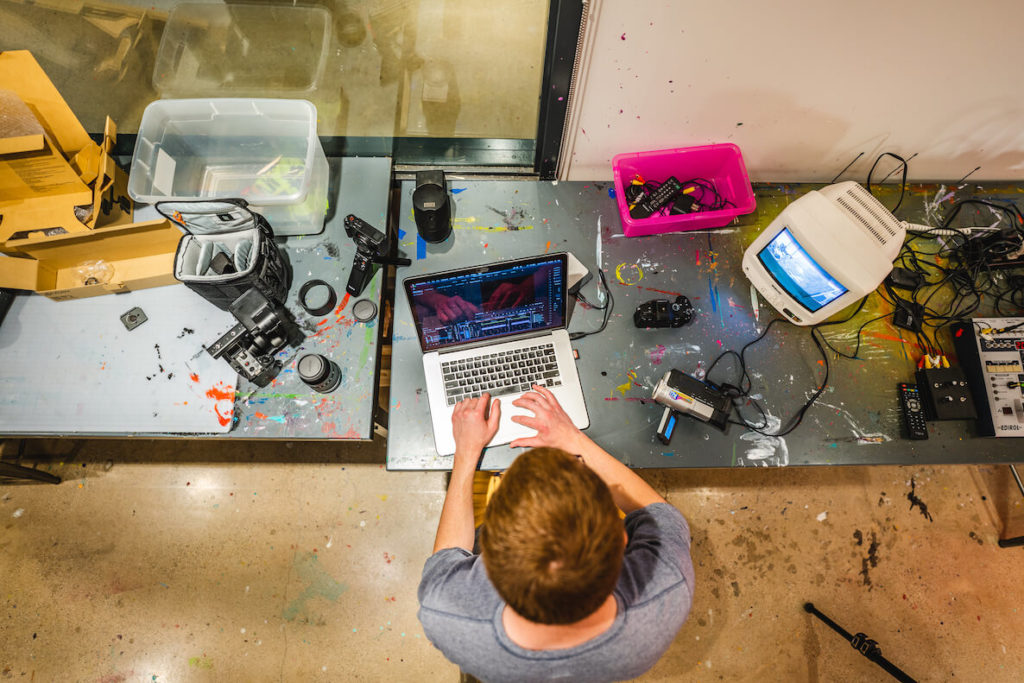
As the pandemic wanes, REC Philly is gearing up to begin hosting live shows again and they plan to continue growing their Philadelphia operations. Though the digital memberships are here to stay, in August of 2020 the business was able to reopen their Fashion District headquarters to members who wanted to use the studio or co-working spaces; now that more people are getting vaccinated, they’re starting to discuss the possibility of hosting shows again. REC Philly has now surpassed 1,000 active members in the Philly area and they plan to hire six new full-time employees in the city this year.
For now, members are just happy to be getting back into the company’s space.
Aponte and his students returned to REC Philly this month, using the space’s conference rooms to work on a grant application that would allow We Love Philly to hire two former students to help create and edit videos documenting their work.
“It’s definitely a global problem for communities that have a drain on their talent and a lack of infrastructure for creatives to thrive in their cities,” Silver says. “This is not just a Philadelphia problem.”
“As long as I’m there with the students, I just let them create the content that they want to create,” Aponte says.
Though Silver and Toms declined to share information about the business’s profitability, they say that their ability to grow their business has largely been due to the strength of their team. And they’re in the process of expanding beyond Philly this year.
Though talks are still early, Toms and Silver have been traveling to other cities to scout locations for REC’s first expansion. Future locations will be branded simply as “REC,” but Silver and Toms plan to work with local creators to make sure each space meets the needs of artists in their particular city. They plan to ask local artists and community leaders to join a city advisory board, which will help steer development as they expand.
Their goal for their next location is in line with their original mission: They want to provide creators with the resources they need to build successful businesses within the cities where they’re already living.
“It’s definitely a global problem for communities that have a drain on their talent and a lack of infrastructure for creatives to thrive in their cities,” Silver says. “This is not just a Philadelphia problem.”



